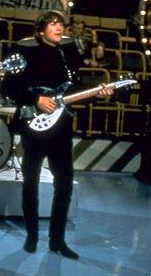 1964: 1963 Rickenbacker 325 Jetglo (black).
Serial No. DB-122. This updated, solid-top 325 was
designed with Lennon in mind but not yet ready when
Rickenbacker president F. C. Hall arrived in New York to
meet with the Beatles before their Ed Sullivan
debut. Hall had heard about the British band
using his guitars, and had tracked down Brian Epstein,
and arranged a private meeting, to which Epstein,
probably with an eye toward replacing Lennon's battered
Hamburg 325, readily agreed. (To this meeting Hall
also brought an electric 12-string, which the group
schlepped over to an ailing George Harrison, and a
prototype Model 4001 bass, which Paul McCartney passed
on, as it was right-handed! Lennon's new 325 --
updated with an extra fine-tune knob, double-layered
pickguard, improved vibrato and slimmer body -- was
shipped to Lennon at the Deauville Hotel in Miami Beach
in time for rehearsals for the second Sullivan broadcast
and immediately took over from the "Hamburg" 325 as
Lennon's workhorse; it saw action right up until late
'65 tours, after which it served as a backup.
Temporarily out of action after Lennon dropped it at the
Hammersmith Odeon during a '64 Christmas show and
cracked the headstock. Last reported on display at the
John Lennon Museum in Japan, where it still has a nasty
crack near the machine heads. 1964: 1963 Rickenbacker 325 Jetglo (black).
Serial No. DB-122. This updated, solid-top 325 was
designed with Lennon in mind but not yet ready when
Rickenbacker president F. C. Hall arrived in New York to
meet with the Beatles before their Ed Sullivan
debut. Hall had heard about the British band
using his guitars, and had tracked down Brian Epstein,
and arranged a private meeting, to which Epstein,
probably with an eye toward replacing Lennon's battered
Hamburg 325, readily agreed. (To this meeting Hall
also brought an electric 12-string, which the group
schlepped over to an ailing George Harrison, and a
prototype Model 4001 bass, which Paul McCartney passed
on, as it was right-handed! Lennon's new 325 --
updated with an extra fine-tune knob, double-layered
pickguard, improved vibrato and slimmer body -- was
shipped to Lennon at the Deauville Hotel in Miami Beach
in time for rehearsals for the second Sullivan broadcast
and immediately took over from the "Hamburg" 325 as
Lennon's workhorse; it saw action right up until late
'65 tours, after which it served as a backup.
Temporarily out of action after Lennon dropped it at the
Hammersmith Odeon during a '64 Christmas show and
cracked the headstock. Last reported on display at the
John Lennon Museum in Japan, where it still has a nasty
crack near the machine heads.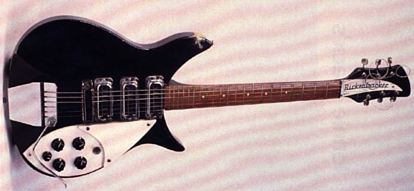 . (photo courtesy of Frank
Trevino) . (photo courtesy of Frank
Trevino) * On Lennon's '63 Rick (right), he bent the vibrato arm, presumably to get it out of his way. When this model went into production it sold for about £400. Rickenbacker has introduced a faithful replica, the 325C63. * First album use: A Hard Day's Night. Last album use: Double Fantasy? Rick Nielsen reported spotting this guitar and playing it a bit during those sessions in August 1980, mentioning "the set list from Shea Stadium scotch-taped to the back of the guitar" [actually it's taped to the top edge], but it's doubtful it appears on any tracks, as it was "unplayable," in Lennon's words. (Check out Glen Lambert's look at the above guitar "In the Wrong Hands." ) |
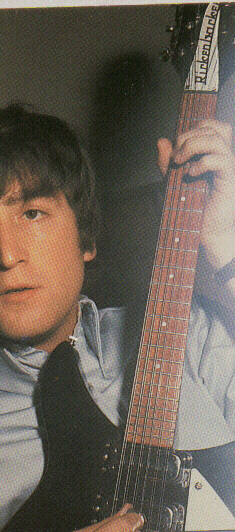 1964: 1964 Rickenbacker 325-12 Jet-glo:
At their New York meeting, Lennon asked Hall to make him
a twelve-string model to match his 325, and in March
'64, Rickenbacker shipped this guitar to him in
London. The only differences are the headstock and
the tailpiece. This short-scale guitar was used on a
Dutch TV show, in the studio (Beatles For Sale)
and served as a backup throughout 1964, and saw actual
use at a show in Boston on 12 September. Tom Hartman,
who recorded in Abbey Road as a young man, recalls
seeing it in the
1964: 1964 Rickenbacker 325-12 Jet-glo:
At their New York meeting, Lennon asked Hall to make him
a twelve-string model to match his 325, and in March
'64, Rickenbacker shipped this guitar to him in
London. The only differences are the headstock and
the tailpiece. This short-scale guitar was used on a
Dutch TV show, in the studio (Beatles For Sale)
and served as a backup throughout 1964, and saw actual
use at a show in Boston on 12 September. Tom Hartman,
who recorded in Abbey Road as a young man, recalls
seeing it in the 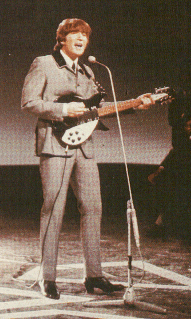 storage area with a set list
taped to it. Rickenbacker CEO John Hall remembers
"seeing this guitar at one point with a vibrato on
it as the model number describes (which didn't
work well at all)." Because it made the
guitar impossible to keep in tune, the vibrato was
removed and replaced with a trapeze tailpiece before
this prototype was sent to Lennon. Most recently
on display at the Rock and Roll Hall of Fame.
Owned by the Lennon Estate.
storage area with a set list
taped to it. Rickenbacker CEO John Hall remembers
"seeing this guitar at one point with a vibrato on
it as the model number describes (which didn't
work well at all)." Because it made the
guitar impossible to keep in tune, the vibrato was
removed and replaced with a trapeze tailpiece before
this prototype was sent to Lennon. Most recently
on display at the Rock and Roll Hall of Fame.
Owned by the Lennon Estate.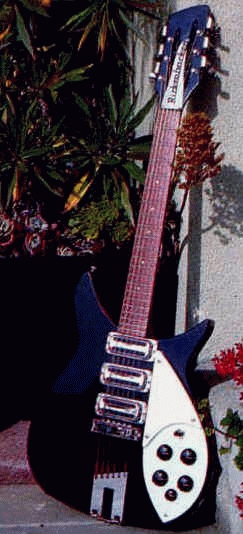
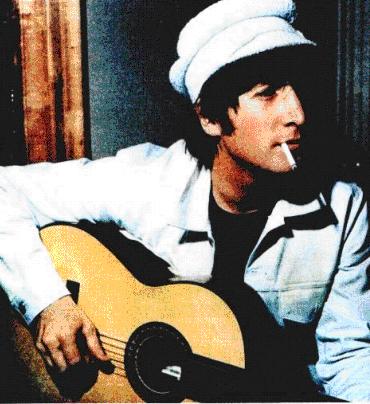 1964:Ramirez A-1 (vintage unknown):
Perhaps at the same time Harrison got one, Lennon
acquired this nylon-string classical guitar, often
called the Segovia model. Probable use in the
studio: "Any Time at All," "I'll Be Back," "And I Love
Her," "Yes It Is" and "I Need You." Like several
other Lennon guitars, its whereabouts is a mystery.
1964:Ramirez A-1 (vintage unknown):
Perhaps at the same time Harrison got one, Lennon
acquired this nylon-string classical guitar, often
called the Segovia model. Probable use in the
studio: "Any Time at All," "I'll Be Back," "And I Love
Her," "Yes It Is" and "I Need You." Like several
other Lennon guitars, its whereabouts is a mystery.